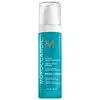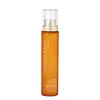What's inside
What's inside
 Key Ingredients
Key Ingredients

 Benefits
Benefits

 Concerns
Concerns

 Ingredients Side-by-side
Ingredients Side-by-side

Cyclomethicone
EmollientDimethicone
EmollientPhenyl Trimethicone
Skin ConditioningBis-Vinyldimethicone
Diphenyl Dimethicone
EmollientParfum
MaskingArgania Spinosa Kernel Oil
EmollientHydrogenated Vegetable Glycerides Citrate
EmollientTocopherol
AntioxidantAscorbyl Palmitate
AntioxidantBeta-Sitosterol
Emulsion StabilisingGlyceryl Linolenate
EmollientLecithin
EmollientHydrogen Dimethicone
Squalene
EmollientPropylene Glycol
HumectantCyclomethicone, Dimethicone, Phenyl Trimethicone, Bis-Vinyldimethicone, Diphenyl Dimethicone, Parfum, Argania Spinosa Kernel Oil, Hydrogenated Vegetable Glycerides Citrate, Tocopherol, Ascorbyl Palmitate, Beta-Sitosterol, Glyceryl Linolenate, Lecithin, Hydrogen Dimethicone, Squalene, Propylene Glycol
Dimethicone
EmollientIsononyl Isononanoate
EmollientC12-15 Alkyl Benzoate
AntimicrobialDimethiconol
EmollientCaprylyl Methicone
Skin ConditioningIsopropyl Palmitate
EmollientDimethicone/Vinyl Dimethicone Crosspolymer
Skin ConditioningArgania Spinosa Kernel Oil
EmollientCamellia Japonica Seed Oil
EmollientTetrahexyldecyl Ascorbate
AntioxidantPropylene Glycol Caprylate
Skin ConditioningOcimum Sanctum Leaf Extract
Skin ConditioningParfum
MaskingPalmitic Acid
EmollientDimethylmethoxy Chromanol
AntioxidantBenzoic Acid
MaskingDimethicone, Isononyl Isononanoate, C12-15 Alkyl Benzoate, Dimethiconol, Caprylyl Methicone, Isopropyl Palmitate, Dimethicone/Vinyl Dimethicone Crosspolymer, Argania Spinosa Kernel Oil, Camellia Japonica Seed Oil, Tetrahexyldecyl Ascorbate, Propylene Glycol Caprylate, Ocimum Sanctum Leaf Extract, Parfum, Palmitic Acid, Dimethylmethoxy Chromanol, Benzoic Acid
Alternatives
Ingredients Explained
These ingredients are found in both products.
Ingredients higher up in an ingredient list are typically present in a larger amount.
You may know this ingredient as argan oil. Argan Oil has antioxidant, hydrating, and soothing properties.
Studies have shown argan oil can help fight again radical damage from the sun. This makes it effective at preventing hyperpigmentation.
Large amounts of vitamin E found in argan oil helps the skin retain water. Argan oil also contains fatty acids such as linoleic acid, oleic acid, and palmitic acid. It is also a good source of lipids.
Another benefit of argan oil is skin-soothing. It can help reduce inflammation-related skin symptoms.
Argan Oil is effective at regulating sebum production in pores. This can make it effective at treating hormonal acne.
Traditionally, argan oil was used for its antibacterial and antifungal properties. However, argan oil contains fatty acids that may make it not fungal-acne safe.
Argan Trees are native to Morocco.
Learn more about Argania Spinosa Kernel OilDimethicone is a type of synthetic silicone created from natural materials such as quartz.
What it does:
Dimethicone comes in different viscosities:
Depending on the viscosity, dimethicone has different properties.
Ingredients lists don't always show which type is used, so we recommend reaching out to the brand if you have questions about the viscosity.
This ingredient is unlikely to cause irritation because it does not get absorbed into skin. However, people with silicone allergies should be careful about using this ingredient.
Note: Dimethicone may contribute to pilling. This is because it is not oil or water soluble, so pilling may occur when layered with products. When mixed with heavy oils in a formula, the outcome is also quite greasy.
Learn more about DimethiconeParfum is a catch-all term for an ingredient or more that is used to give a scent to products.
Also called "fragrance", this ingredient can be a blend of hundreds of chemicals or plant oils. This means every product with "fragrance" or "parfum" in the ingredients list is a different mixture.
For instance, Habanolide is a proprietary trade name for a specific aroma chemical. When used as a fragrance ingredient in cosmetics, most aroma chemicals fall under the broad labeling category of “FRAGRANCE” or “PARFUM” according to EU and US regulations.
The term 'parfum' or 'fragrance' is not regulated in many countries. In many cases, it is up to the brand to define this term.
For instance, many brands choose to label themselves as "fragrance-free" because they are not using synthetic fragrances. However, their products may still contain ingredients such as essential oils that are considered a fragrance by INCI standards.
One example is Calendula flower extract. Calendula is an essential oil that still imparts a scent or 'fragrance'.
Depending on the blend, the ingredients in the mixture can cause allergies and sensitivities on the skin. Some ingredients that are known EU allergens include linalool and citronellol.
Parfum can also be used to mask or cover an unpleasant scent.
The bottom line is: not all fragrances/parfum/ingredients are created equally. If you are worried about fragrances, we recommend taking a closer look at an ingredient. And of course, we always recommend speaking with a professional.
Learn more about Parfum